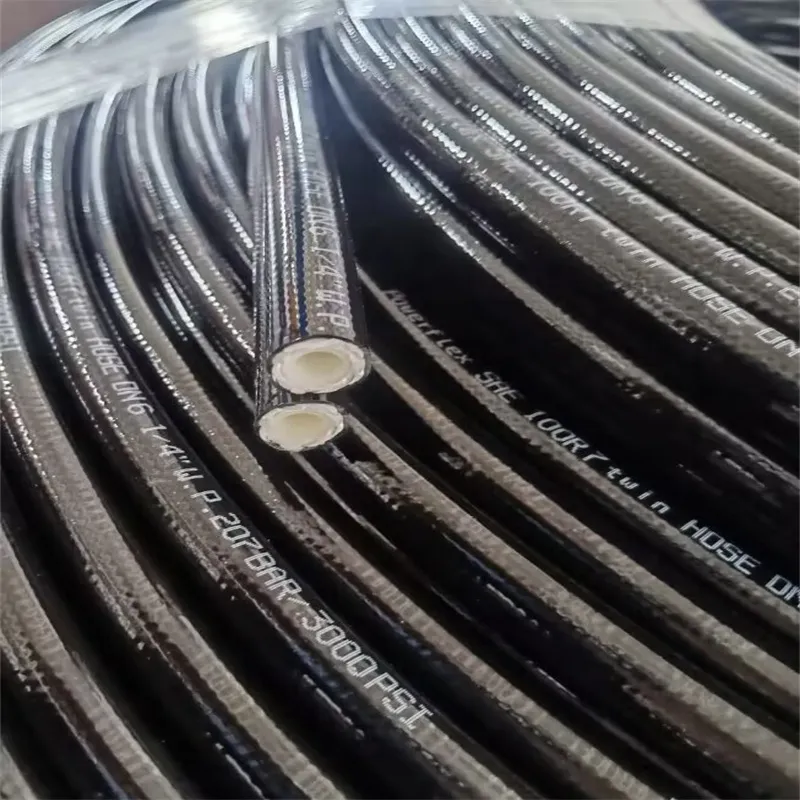Jul . 29, 2024 19:19 Back to list
CE Certified Smooth Cover Hydraulic Hose Manufacturing Facility for Quality Assurance and Performance Standards
CE Certification for Smooth Cover Hydraulic Hose Manufacturing
In today’s industrial landscape, safety and quality assurance are paramount. One crucial element in achieving these standards in the hydraulic industry is the CE certification for hydraulic hoses, particularly those featuring a smooth cover. This article explores the importance of CE certification, the specific benefits of smooth cover hydraulic hoses, and the manufacturing practices involved in ensuring compliance with this essential regulation.
Understanding CE Certification
CE marking denotes that a product meets the European Union’s health, safety, and environmental protection standards. For manufacturers producing hydraulic hoses, obtaining CE certification signifies that their products have undergone rigorous testing and assessments. This certification not only facilitates access to the European market but also enhances consumer confidence, affirming that the products are reliable and safe for use.
Importance of Smooth Cover Hydraulic Hoses
Smooth cover hydraulic hoses are preferred in many applications due to their unique properties. The smooth outer surface reduces friction, which helps in several ways. Firstly, it minimizes the wear and tear of the hose itself, thereby extending its lifespan. Secondly, a smoother surface simplifies cleaning and maintenance, which is particularly beneficial in industries where contamination control is critical.
These hoses are typically used in various applications across sectors such as construction, agriculture, and manufacturing. They can handle high pressure and are resistant to abrasion and weather elements, making them ideal for outdoor and heavy-duty use. Ensuring that these hoses are CE certified not only meets regulatory requirements but also assures users of their durability and effectiveness.
ce certification smooth cover hydraulic hose factory

Manufacturing Practices for CE Certification
The pathway to obtaining CE certification for smooth cover hydraulic hoses involves adhering to specific manufacturing practices that align with EU regulations. This process begins with selecting high-quality materials that can withstand the rigors of hydraulic applications. The materials used need to comply with European standards regarding strength, flexibility, and resistance to environmental factors.
Next, the manufacturing process must be meticulously controlled. This includes rigorous testing for pressure resistance, tensile strength, and flexibility. Manufacturers should also implement quality assurance protocols at every stage of production, from raw material sourcing to final product inspection. Documentation is key in this process; maintaining detailed records of testing, procedures, and compliance is essential for successful certification.
Moreover, manufacturers must invest in ongoing training for their staff. Understanding the requirements of CE certification and the importance of compliance in every aspect of production helps foster a culture of quality. Regular audits and updates to manufacturing practices based on the latest regulations ensure that the products remain compliant and competitive.
Conclusion
In conclusion, CE certification is a vital aspect of manufacturing smooth cover hydraulic hoses, ensuring these products meet essential safety and performance standards. The benefits of smooth cover hoses, including reduced friction and improved durability, make them a sought-after choice across various industries. Through strict adherence to quality manufacturing practices, investment in staff training, and a commitment to continuous improvement, manufacturers can achieve CE certification and deliver reliable, high-quality hydraulic hoses to the market. As industries evolve, the importance of such certifications will only grow, reinforcing the commitment of manufacturers to safety, quality, and environmental responsibility.
-
Best Four Steel Wire Spiral Hose Hydraulic R12 – Durable High-Pressure Hose Manufacturer
NewsJul.08,2025
-
High-Quality 1/4 Hydraulic Hose – Soft, Flexible & Durable Rubber Hoses for Industrial Use
NewsJul.08,2025
-
1 1 2 Inch Hydraulic Flexible Hose - Durable, Reliable, High-Pressure Solutions
NewsJul.07,2025
-
High-Quality 1 2 Rubber Hose - Durable, Flexible Hydraulic Solutions
NewsJul.07,2025
-
Discover SAE Hydraulic Hose Types - High Quality & Durable Hoses from Leading Factory Supplier
NewsJul.06,2025
-
High Pressure Wire Hydraulic Rubber Hose Supplier Durable & Reliable 1SN Hose Solutions
NewsJul.06,2025
